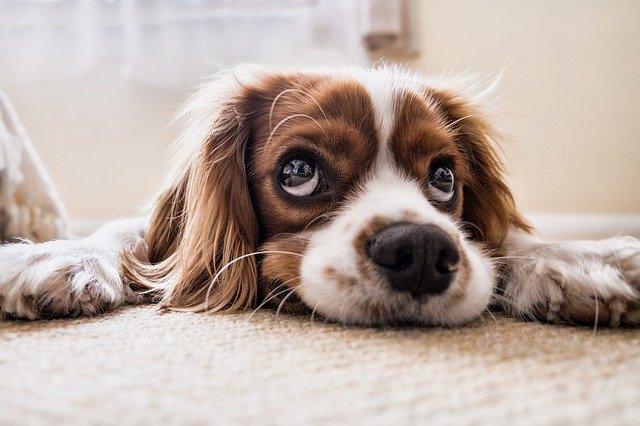You have only this one question: “How to get Puppies to stop whining at night?”.
One of the most exhilarating experiences for any dog lover is bringing home a little pup. It is an exciting new experience and you will learn a lot of things related to your dog and his habits. Although some of these habits may be a cause of stress for dog owners.
The most common amongst these practices is your pup’s anxious cries at night. This is a completely normal thing but can be very distressing for any dog owner. There is a lot of advice going around on the internet related to this problem, but here are our top seven tips that will ensure that your pup settles in and relaxes.
The first thing is to understand is, why is your pup making these sad and disturbing sounds. Recall the day when you brought your pup home for the first time. The pup was most probably still with his mom and other littermates. He was pretty familiar with those surroundings and people.
Now, he has a nice big house and a soft bed– but it’s quiet, it doesn’t smell the same and he is probably confused. But don’t worry as he won’t be confused anymore and snooze easy if you follow these 7 tips.

Why do puppies whine at night?
Like all mammals, puppies whine to alert those around them of their needs or if they are in danger. Crying in small puppies is usually due to some underlying problems, such as
- Pain
- Appetite
- Toilet Requirements
- Fear
Puppies also cry to get their master’s attention. Now let’s have a look at some of these common problems briefly, and what you can do to eliminate the puppy whining at night.
1. Puppy whining due to toilet requirements
This is where your potty training skills come in handy. Your pup can hold his urge to go potty or pee for so long. Make it a habit that the very last thing you do before turning in for the night is taking your pup outside for a toilet break.
During the early stages of puppyhood, your furry friend might be able to hold his pee for a few hours, so you might have to go outside in the garden pretty early.
So if you have just woken up to your dog’s crying and whining, then follow these simple steps to make sure that your pup properly relieves himself and stops crying.
- Avoid chattering with your pup as he might think that it’s playtime, and forgets all about as to why he woke you up in the first place.
- Avoid praising, petting, or giving treats to your dog. Just pick him up and take him to his toilet spot
- If he doesn’t relieve himself, wait a while but at the same time resist the need to pet him, no matter how much you want to. Wait until he has done his business.
- After he is done, praise your pup a lot and give him a treat as well.
- Return your pup to his sleeping area and return to your bed without creating a fuss.
That’s all about it when it comes to your pup whining at night because he needs to relieve himself. The key is to keep things brief and to the point.
2. Crate training your puppy
You have to decide whether crate training is right for both you and your pup. You might need to do a little research for this one, as it isn’t as simple as putting your pup in a crate and leaving him there.
What this entails is whether your pup has a positive association with his crate and considers it his safe place. A pup properly crate-trained will not cry and think about taking a nap when he is in there.
- Start by feeding your pup his regular meals in the crate, reward him as soon as he enters the crate and make sure no one bothers him when he is in there.
- Once your pup positively associates these things with his crate, you will observe that he will settle down more easily and take his nap in his crate.
- Some additional aspects of crate training involve not opening the crate door unless your pup is quiet and calm. This is for the same reason so the pup doesn’t whine at night.
3. Comfort is more important than Attention
You must understand that the sound of your puppy whining is more dramatic than it is. Giving your dog attention when he or she starts to whine, will only mean that they will employ the same tactic over and over again. And it will become a non-stop feature of their nightly routine.
- So instead of providing cuddles and pats, start by letting your furry friend sleep in his crate or pen. But the key is to keep the crate or the pen near you so that they know you are there.
- For pups a simple ShhShh! command to say keep quiet might be interpreted as a sign of getting attention. So you avoid any unnecessary chatting with your pup at night. With time your pup will start to get comfortable in his crate and rest easy. Once that happens you can slowly start to move his crate to the location where you want to place it.
- You can also place one of your old t-shirts or a piece of clothing that smells of you. This will help your pup relax into his sleeping area and feel more familiarized.
4. Exert your pup every day
A pup that is nice and exhausted, will have less energy for creating any unnecessary hassle. He will opt for a nap rather than whining.
- You can incorporate a lot of different activities to wear him out, like puppy games, exercises, training, etc.
- For example, if playing outside is not an option because your pup hasn’t received all of his vaccinations or bad weather conditions. Then food puzzles are a great way to exercise your pup’s brain.
5. Follow a fixed routine
Always remember to keep your pup on a fixed routine. This can be done by ensuring that your pup goes to sleep in the same place and at the same time every day. This will help you greatly if you want to avoid unnecessary puppy whining.
Make sure that there aren’t any substantial changes to the conditions of the pup’s sleeping area. Like if you want the blinds/curtains open or closed in that particular area, then they should be the same from the get-go. Avoid mixing things up as this will create confusion for your pup. As a result, you will have to face sleepless nights.
Also make a habit of waking up early in the morning, before all the crying and whining starts. This will create a sense of reassurance for your pup when you are the first thing they see each morning.

6. Avoid unnecessary distractions
Your pup doesn’t require much to get into the mood of taking a nap. He only needs a comfortable bed and a nice environment.
Just make sure that they don’t have unnecessary distractions like their favorite toys or treats laying around in their sleeping area.
As pups can be very naughty, they shouldn’t be left with toys and food. They should only have access to freshwater. But remember to not leave a water bowl in their room as they can fall asleep in it or make a mess of things.
Also, food and water just before bedtime mean that your pup will need to take a toilet trip in the middle of the night. So give them food well in time.
7. Always check for other problems
After trying all the above-mentioned tips, if your pup is still whining at night, then it might be a good idea to look into other reasons for distress.
- Observe whether your pup is not sleeping due to a draft
- Check if their bedding is warm enough
- Check if there are any weird noises at night that might be keeping them up.
- Check for any injuries or signs of illness,
- Always remember that it can take a couple of days for a new approach to start working
- You have to be patient as it might take longer for things to work.
- If there are no signs of relief, pop in to see your vet. He will make sure there isn’t anything else that is keeping your furry best friend awake at night.
Conclusion on “How to get Puppies to stop whining at night”
Now to conclude this article, always try to avoid triggering the puppy’s fear response or teach him to cry for attention. For the first five or six nights, keep your pup close by as these are some of the hardest days for him.
Always train your puppy to be alone during the day for short periods from the second week onwards. Increase this time duration for being alone gradually. Provide the puppy with plenty of company, and interaction so that he associates with it positively.
